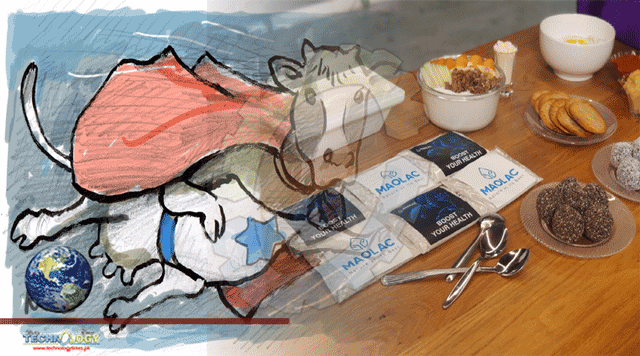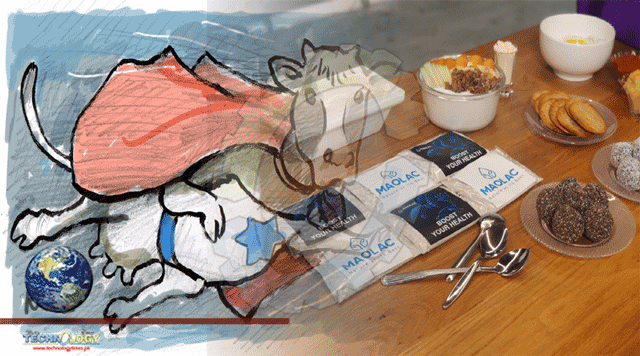Maolac creates a nutrient-rich superfood supplement from bovine premilk colostrum instead of pouring it down the drain

Maya Ashkenazi was nursing her first child when she had a brainstorm. What if we could make the benefits of mother’s milk available to everyone: athletes, the elderly, even household pets?
“I realized that if I could crack the code of breast milk – which is jam-packed with functional proteins – I could surely make it more accessible to everyone, and not just to babies,” she says.
That was four years ago, when Ashkenazi was 26. This summer, the company she founded plans to do just that.
Maolac, a pre-revenue Israeli startup, is the first company in the world to identify and extract functional proteins from bovine colostrum – the first, nutrient-rich premilk superfood produced by mammals for their newborns – that are 95% equivalent to those found in human colostrum.
Ashkenazi and her colleagues have created a protein-rich superfood from bovine colostrum, which is currently dumped down the drain at dairies.
“There are more than five billion liters of colostrum worldwide that is thrown away each year,” she says. “Maolac will be the first company to upcycle colostrum. We are creating something new from something that is basically waste.”
Maolac’s products will be marketed internationally to food manufacturers as a tasteless, odorless additive to their own foods – from yogurt, ice cream and cereals to bread, pasta and energy bars.
More effective
“Maolac combines fractional amounts of specific proteins in a variety of formulas that have proven more effective than colostrum ‘as-is’ in regulating human infections, inflammation and the immune system,” says Dr. Jacob Rachmilewitz, principal investigator at the Gene Therapy Institute of Hadassah Hospital in Jerusalem.
“Six times more effective,” adds Ashkenazi, who earned her masters degree in biomedical engineering from the Technion-Israel Institute of Technology and in 2020 was named one of Forbes’ “30 Under 30” outstanding young Israeli entrepreneurs.
Bovine colostrum is already available as a dietary supplement but is not much use to humans in its raw form, Ashkenazi says.
“The truth is, it’s really only good for calves. It doesn’t help, and may even harm, humans,” she says. Using a proprietary extraction technology, “Maolac identifies and extracts only the relevant, most bio-similar proteins, increasing their potency to address specific health issues.”
The company has succeeded in isolating, extracting, and sorting 1,500 bio-active proteins in bovine colostrum, 400 of which are 95% bio-similar to human breastmilk, creating combinations that contain up to 20 of these proteins to support specific immunological functions.
Maolac was developed at The Kitchen, a foodtech incubator backed by Strauss, and is the first Israeli company to be accepted to MISTA, an innovation platform for the global food industry founded by Givaudan, the world’s largest multinational manufacturer of flavors, fragrances and active cosmetic ingredients.
“Consumers – and therefore manufacturers – are becoming less interested in drugs and more interested in boosting their health through foods,” says Jonathan Berger, CEO of The Kitchen, which is also supported by the Israel Innovation Authority.
“Maolac is unique in the sense of harnessing technology to provide consumers with quality proteins – and the most efficient ones for their specific needs. Now there’s no need for another pill before or after breakfast. Eat what you like, just in a fortified version,” Berger says, predicting more initiatives combining the food industry and health technology.
Maolac’s first consumer-oriented pilot will launch this summer and will be followed by clinical trials. It will include a full-scale supply chain and manufacturing process for Maolac products like the superfood, including an anti-inflammatory especially suitable for athletes and a next-generation probiotic to support intestinal health.
Regulatory approval
Regulatory approval in Israel, Europe, and the United States is expected to come shortly, Ashkenazi says. Whole bovine colostrum is already approved for human consumption and only the new mixture of elements requires additional regulatory confirmation.
Full commercial launch is projected for early 2023, far ahead of competitors, Ashkenazi says. While other companies are trying to cultivate breastmilk, none have succeeded in isolating its biofunctional proteins, because they lack Maolac’s proprietary algorithm.
Maolac could grow fast. The immune-boosting food market is projected to more than double, to $46.9 billion, by 2030, according to Allied Market Research. Raw colostrum will represent more than 10 percent of that total, according to Transparency Market Research. The infant, sports, healthy aging and pet nutrition markets – those most applicable to Maolac – are valued at more than $300 billion combined.
The product will also be reasonably priced, Ashkenazi says, making it accessible for daily use.
“Finally, we have an affordable way to make the whole world healthier,” she says.
Source: Times of Israel
